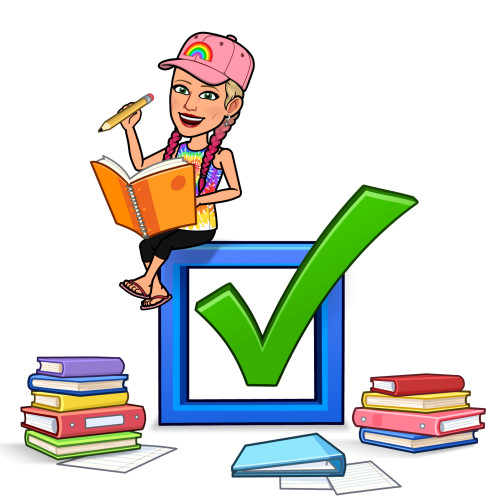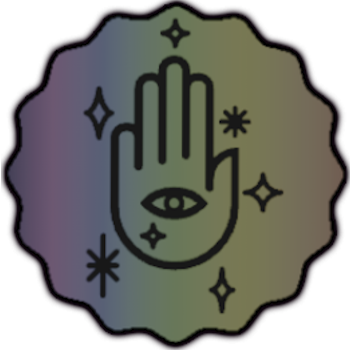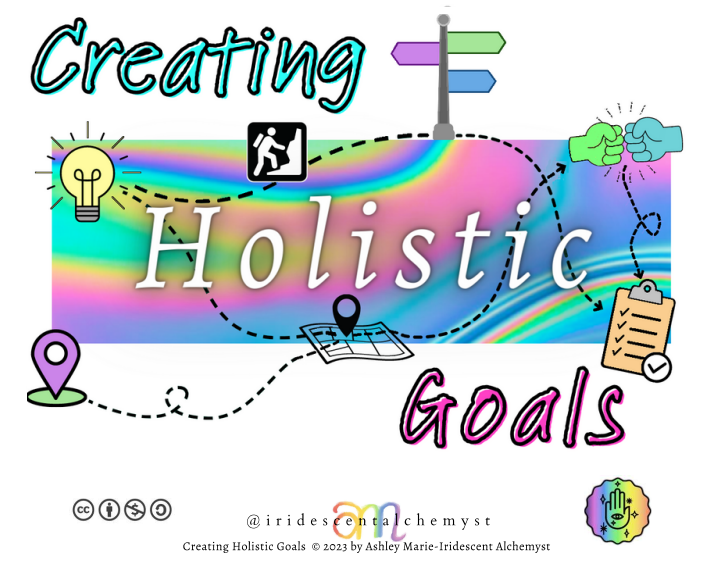Creating Holistic Goals Course © 2023 by Ashley Marie-Iridescent Alchemyst is licensed under Attribution-NonCommercial-ShareAlike 4.0 International. To view a copy of this license, visit http://creativecommons.org/licenses/by-nc-sa/4.0/
Course Description
The following information is from the Course Syllabus. Click the link to download a copy.
The process of setting holistic goals involves examining all aspects of a person’s health and well-being. There is so much going on in the world today, and with the baggage of the past, it is difficult to know where to start and where to go from here!
Studies show that creating specific and time-bound goals for yourself drastically increases the likelihood that you will be successful. Based on the principles of Ikigai and Holistic Management, the self-assessment and reflection activities in this course will help you determine your values, passions, strengths, weaknesses, needs, areas for improvement, and resources available to you. These components are the foundation for creating your own personal holistic goals.
The coursework will guide you through the process of collaboration with a partner and/or group to determine your collective mission and values and develop a plan with systems that accommodate and support each individual’s goals as well. The groups missions, values, and comprehensive plan will provide direction for the group, criteria for monitoring progress, guidelines for communicating and troubleshooting, and protocols for re-evaluation and making adjustments.
I have decided to release my presentation slides and workbooks for MODULES ONE THROUGH FOUR! Click the buttons below to access the view-only files on Canva!
Audience
- Teens
- Adults of all ages
- Couples
- Families
- Groups
Format
Self-Guided Study Modules +Workbook
E-course- COMING SOON!
Learning Outcomes
Experts have identified three main domains of educational activities:
- Cognitive: mental skills (Knowledge)
- Affective: growth in feelings or emotional areas (Attitude)
- Psychomotor: manual or physical skills (Skills)
After any educational training, the learner should have acquired new knowledge, skills and/or
attitudes; these are the expected outcomes.
KNOWLEDGE
Upon completing this course, you will have a greater understanding of:
- yourself as a person as evidenced by confident discussion of your personal strengths, needs, values, and areas of focus for improvement.
- holistic SMART goals as evidenced by ability to describe the components of and process for developing.
- emotional intelligence as evidenced by control and proper expression of emotions and correct interpretation of emotions in others.
- collaboration as evidenced by rapid improvement in personal and professional relationships.
SKILLS
Upon completing this course, you will demonstrate knowledgeable application of:
- self-assessment skills as evidenced by performing an objective and thorough analysis of values, needs, and current self-care practices.
- holistic SMART goals as evidenced by formulation of Specific, Measurable, Attainable, Relevant, and Timely personal goals.
- the collaborative process as evidenced by appropriate planning, strategic implementation, thorough monitoring and evaluation of plans, and adaptability in making adjustments to the plan.
ATTITUDE
Upon completing this course, you will:
- report notable improvement in interpersonal communications and relationships.
- report notable improvement in work-life balance and overall satisfaction.
- report ongoing progress with individual and group goals.

Course Prerequisites
- This is an entry-level course designed for students aged 16 years and older.
- It is recommended that you take this course with others in your life to gain the greatest benefit, but it is not required.
- Completion of Pre-Assessment Anxiety-Stress-Depression test (See Pre-Assessment)
Pre-Assessment
- To assist with course evaluation with regard to goals and learning objectives, participants are requested to complete a brief, 30-question quiz- the Anxiety-Stress-Depression (ASD) Test and submit a screenshot or general statement of your results, but it is not required.
- The ASD test is available online on the IDR Labs website. (link below)
- The results of this test, taken before and after the course, will help me gauge the effectiveness of the activities and information presented. Individual results will be kept 100% confidential.
- A pre-course survey is available, to help me better help you succeed, and is available by clicking the link below.
Accessibility
Accessibility involves needs that, when met, “enable participation in the course to the fullest–therefore they are wide-ranging and can be met in wide-ranging, creative ways.” This course was designed to be completed on your own, as self-paced modules, with the option to participate in an online setting, or a face-to-face instructor-led group setting when available. Group work requires a shared commitment to each other’s well-being and learning in the community space; it requires communication and negotiation and flexibility.
Additional resources and accomodations are available upon request. Please let me know if anything comes up that makes participation feel difficult or interferes with your learning, so we can troubleshoot your concerns privately and as a group, if necessary. Suggestions you have about making this class more accessible for you will potentially make it more accessible and inclusive for everyone.
Diversity, Equality, & Inclusion
There is beauty in diversity that leads to strength and accomplishments. Everyone has the right and responsibility to build and maintain an safe and secure, comfortable atmosphere that supports the exchange of ideas, founded in principles of equality and inclusion. Consider this practice for real-world discussions about difficult topics.
Respect and compassion are required at all times.
Discrimination based on race, color, religion, sex (including pregnancy, sexual orientation, or gender identity), national origin, disability, age (40 or older) or genetic information (including family medical history) is illegal and will result in immediate removal from any and all face-to-face and remote group settings.
Course Materials
- Creating Holistic Goals module
- Creating Holistic Goals workbook and/or notebook/journal
- Phone, tablet, laptop, or PC with high-speed internet access
MODULES & WORKBOOK ACTIVITIES
In Module 1 , we will explore:
- Your Current Resources
- Your Personality Type traits/characteristics
- Your Hobbies, Interests, Passions
- Your strengths and life purpose
- Your weaknesses and areas for improvement
In Module 2 , we will examine:
- How values influence your decisions
- What values are most important to you
- Your personal needs
- Your self-care practices
- Positive ways for meeting your needs
- How to write holistic SMART goals
In Module 3, we will DEVELOP:
- SMART self-care
- Your personal holistic goals
In Module 4, we will LEARN:
- The importance of Emotional Intelligence
- Workplace Personality Types
In Module 5, we will COLLABORATE on:
- Establishing mutual group goals
- Systems for Accomplishing Goals
- Criteria for Monitoring Progress
- Planning for Re-evaluation and Adjustments
Workbook ONE- KNOW THYSELF
- 1.1 Eysenck’s Personality Inventory (EPI)
- 1.2 Personality Test
- 1.3 Current Resources
TWO- KNOW THY VALUES & NEEDS
- 2.1 Celebration of Life
- 2.2 Ultimate Master List of Personal Values
- 2.3 Personal Values Reflection
- 2.4 Personal Values Inventory
- 2.5 Top Personal Values
- 2.6 Self Care Assessment
- 2.7 Self Care Needs
- 2.8 Primary Personal Needs
THREE- KNOW THY GOALS
- 3.1 Self Care Goals
- 3.2 Quality of Life Statement
- 3.3 Personal Holistic Goals
FOUR- KNOW THY TEAM
- 4.1 Emotional Intelligence
- 4.2 Workplace Personality
FIVE- TEAMWORK MAKES THE DREAM WORK
- 5.1 Collaborate about values, goals
- 5.2 Define Roles and Responsibilities
- 5.3 Testing Actions and Decisions
- 5.4 Criteria Screen
- 5.5 Planning
Resources & Additional Reading
- Resources are listed at the end for those that prefer more guidance through the process or more information about the topics presented.
- A significant portion of this modules and the workbook are based on the work of Atina Diffley’s Quality of Life tools; Diffley’s work was largely based on the book Holistic Management by Allan Savory with Jody Butterfield. Quality of Life Tools and Systems For A Healthy Farming Partnership (https://atinadiffley.com/quality-of-life-handouts/) by Atina Diffley is licensed under CC by 4.0 (https://creativecommons.org/licenses/by/4.0/)
- Links provided for accompanying online activities are from 3rd party sites. I specifically chose them after researching several possible options and found them to be the most valid and relevant for the course. I am not responsible for maintaining them. Hopefully they will remain free and available to the public. If not, please let me know so that I can provide updated links.
Special Considerations
- It can be helpful to do this work as a group with someone leading the group through the steps, but it is important to hold group discussions until everyone has defined his/her own goals.
- Often, sharing personal experiences can enrich a discussion. It is important to me that this decision remains yours. Do not feel pressured to disclose if it makes you uncomfortable. How, when, and indeed if you bring in something from your own life is up to you.
Assignments & Grading
- The assignments in this course are not graded.
- There is no graded test for this course. Applying these concepts in your life is the test.
- As previously discussed, individuals are requested to complete the Anxiety-Depression-Stress test.
- Upon completion, the link to a survey is available online for course and instructor specific feedback.
Community Standards
- Approach ideas with a growth mindset. (I can’t do this…YET! It won’t work… YET!)
- Respond to and challenge ideas, not people.
- Be brave and take risks, participate, try things.
- Be kind and mindful of the words and tone you use (e.g., nonverbal cues, humor, and sarcasm do not translate well online); invite others to help you learn to be more inclusive.
- Take responsibility for the impact of your comments and actions, regardless of intent.
- Respect the visual space. (Please refrain from displaying inappropriate or distracting images that have the potential to disrupt learning)
- Take a moment when you need to think. We will be discussing difficult and sometimes personal concepts.
ZOOM Netiquette
- Take a bathroom break before you sit down.
- Arrive 5 minutes early to Zoom sessions to log in and test your audio and video, so sessions can begin on time. Come prepared with the materials you will need.
- Keep your microphone muted unless speaking to reduce background noise.
- It’s okay to sip on a beverage but save your meals or snacks for later.
- If possible, show video, especially when speaking.
- Position your camera appropriately and maintain eye contact.
- Avoid multitasking and stay focused on the task at hand.
- Take a moment make sure your name is correctly displayed.
- Enable your Zoom group chat panel and “reactions” such as raise hand, yes/no, thumbs up/down.
- If you need to step away from the meeting for a moment, please use the chat to let one of the facilitators know (e.g., Be Right Back (BRB)) so we know you are OK.
Thank you for your interest in this course! I have been working very hard to put everything together! Video lessons to accompany the modules and workbook are currently in production as I search for an online learning platform.
If you are interested in taking this course as a self-guided study, please submit the form below to receive the course modules and workbook.

